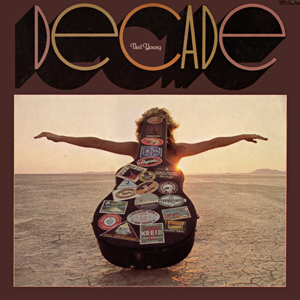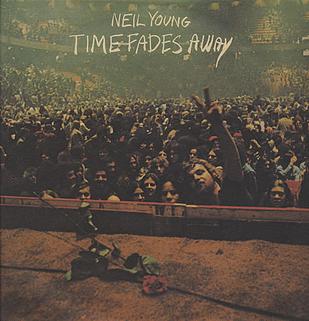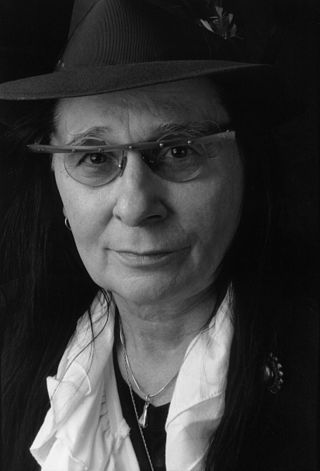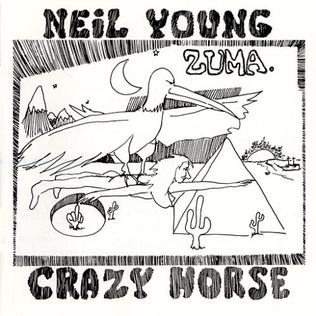
Decade is a compilation album by Canadian–American musician Neil Young, originally released in 1977 as a triple album and later issued on two compact discs. It contains 35 of Young's songs recorded between 1966 and 1976, among them five tracks that had been unreleased up to that point. It peaked at No. 43 on the Billboard Top Pop Albums chart, and was certified platinum by the RIAA in 1986.

Tonight's the Night is the sixth studio album by Canadian / American songwriter Neil Young. It was recorded in August–September 1973, mostly on August 26, but its release was delayed until June 1975. It peaked at No. 25 on the Billboard 200. The album is the third and final of the so-called "Ditch Trilogy" of albums that Young released following the major success of 1972's Harvest, whereupon the scope of his success and acclaim became so difficult for Young to handle that he subsequently experienced alienation from his music and career.

After the Gold Rush is the third studio album by the Canadian-American musician Neil Young, released in September 1970 on Reprise Records. It is one of four high-profile solo albums released by the members of folk rock group Crosby, Stills, Nash & Young in the wake of their chart-topping 1970 album Déjà Vu. Young's album consists mainly of country folk music along with several rock tracks, including "Southern Man". The material was inspired by the unproduced Dean Stockwell-Herb Bermann screenplay After the Gold Rush.

Crazy Horse is an American rock band best known for their association with Neil Young. Beginning in 1969 and continuing to the present day, they have been co-credited on a number of Young's albums, with 15 studio albums and numerous live albums being billed as by Neil Young and Crazy Horse. They have also released six studio albums of their own, issued between 1971 and 2009.

Everybody Knows This Is Nowhere is the second studio album by Canadian-American musician Neil Young, released in May 1969 on Reprise Records, catalogue number RS 6349. His first with longtime backing band Crazy Horse, it emerged as a sleeper hit amid Young's contemporaneous success with Crosby, Stills, Nash & Young, ultimately peaking at number 34 on the US Billboard 200 in August 1970 during a 98-week chart stay. It has been certified platinum by the RIAA.

Neil Young is the debut studio album by Canadian/American musician Neil Young following his departure from Buffalo Springfield in 1968, issued on Reprise Records, catalogue number RS 6317. The album was first released on November 12, 1968, in the so-called 'CSG mix'. It was then partially remixed and re-released in late summer 1969, but at no time has the album ever charted on the Billboard 200.

Time Fades Away is a 1973 live album by Canadian-American musician Neil Young. Consisting of previously unreleased material, it was recorded with the Stray Gators on the support tour following 1972's highly successful album Harvest. Due to Young's dissatisfaction with the tour, it was omitted from his catalogue and not released on compact disc until 2017. The album is the first of the so-called "Ditch Trilogy" of albums that Young recorded following the major success of Harvest, whereupon the scope of his success and acclaim became so apparent that Young subsequently experienced alienation from his music and career.
Danny Ray Whitten was an American guitarist and songwriter, best known for his work with Neil Young's backing band Crazy Horse, and for the song "I Don't Want to Talk About It", a hit for Rod Stewart and Everything but the Girl.

Bernard Alfred "Jack" Nitzsche was an American musician, arranger, songwriter, composer, and record producer. He first came to prominence in the early 1960s as the right-hand-man of producer Phil Spector, and went on to work with the Rolling Stones and Neil Young, among others. He also worked extensively in film scores, notably for the films Performance, The Exorcist and One Flew Over the Cuckoo's Nest. In 1983, he won the Academy Award for Best Original Song for co-writing "Up Where We Belong" with Buffy Sainte-Marie.

Zuma, the seventh studio album by Canadian/American musician Neil Young, was released on Reprise Records in November 1975. Co-credited to Crazy Horse, it includes "Cortez the Killer", one of Young's best-known songs.

Live at the Fillmore East is a live album by Neil Young and Crazy Horse featuring guitarist Danny Whitten, released in 2006. It also has the distinction of being the first album released as part of the Neil Young Archives series of archival recordings.
The Stray Gators was the name given by Neil Young to his supporting musicians from 1971 to 1973 and who backed him on the albums Harvest (1972) and Time Fades Away (1973). It consisted of Jack Nitzsche (piano), Ben Keith, Tim Drummond (bass) and Kenny Buttrey (drums); the latter replaced during the Time Fades Away tour by Johnny Barbata.

Neil Young Archives Vol. 1: 1963–1972 is the first in a planned series of box sets of archival material by Canadian-American musician Neil Young. It was released on June 2, 2009, in three different formats - a set of 10 Blu-ray discs in order to present high resolution audio as well as accompanying visual documentation, a set of 10 DVDs and a more basic 8-CD set. Covering Young's early years with The Squires and Buffalo Springfield, it also includes various demos, outtakes and alternate versions of songs from his albums Neil Young, Everybody Knows This Is Nowhere, After the Gold Rush, and Harvest, as well as tracks he recorded with Crazy Horse and Crosby, Stills, Nash & Young during this time. Also included in the set are several live discs, as well as a copy of the long out-of-print film Journey Through the Past, directed by Young in the early 1970s.

She Used to Wanna Be a Ballerina is the seventh album by Buffy Sainte-Marie, released in 1971.

Loose is a 1972 album by the rock band Crazy Horse, the follow-up to their self-titled debut. It marked the departure of founding guitarist Danny Whitten, as well as Jack Nitzsche and Nils Lofgren. In their place for this album were George Whitsell and Greg Leroy on guitars, and John Blanton on organ.

Gone Dead Train: The Best of Crazy Horse 1971–1989 is a 2005 compilation album released by Crazy Horse.

Scratchy: The Complete Reprise Recordings is a 2005 compilation album released by the group Crazy Horse. It is a re-issue of the first two Crazy Horse albums, Crazy Horse and Loose, on Reprise Records, with bonus tracks and the first single by the pre-Crazy Horse group Danny & The Memories.

Neil Young Archives Volume II: 1972–1976 is a 10-CD box set from American-Canadian folk rock musician Neil Young that was initially released in a limited deluxe box set on November 20, 2020. The release is the second box set in his Neil Young Archives series, following 2009's The Archives Vol. 1 1963–1972, and covers a three-and-a-half-year period from 1972–1976. The track list was officially announced on the Neil Young Archives site on September 20, 2020, with the first single, "Come Along and Say You Will", being posted to the site as the Song of the Day on October 14. The set then went up for pre-order on October 16, 2020, as an exclusive release to his online store, with only 3,000 copies being initially made available worldwide. After selling out the following day, Young announced several weeks later that a general retail version, as well as a second pressing of the deluxe box set, is expected to be released to market on March 5, 2021. This was followed by the release of a second single, "Homefires", on October 21, and a third, an alternate version of "Powderfinger", on November 3.

Barn is the 41st studio album by Canadian-American singer-songwriter Neil Young and his 14th with American rock band Crazy Horse. The album was released on December 10, 2021, by Reprise Records. A stand-alone film of the same name directed by Young's wife Daryl Hannah was also released for streaming and on Blu-ray.

"Come On Baby Let's Go Downtown", also known as "(Come On Baby Let's Go) Downtown" or "Downtown", is a song written by Danny Whitten, possibly in collaboration with Neil Young, that was first released on Crazy Horse's 1971 album Crazy Horse. A live version was later released on multiple Neil Young albums, most famously on his 1975 album Tonight's the Night, and then on his 2006 album Live at the Fillmore East. Phish has covered the song in concert.


















